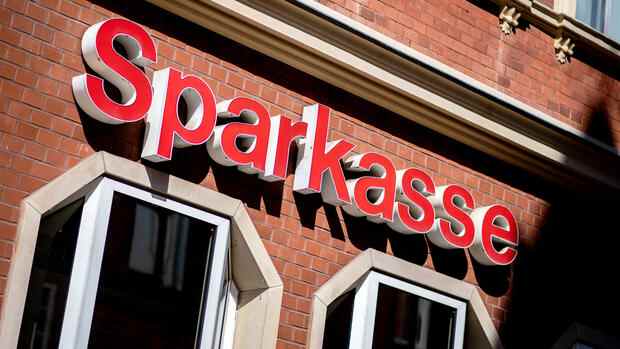The German savings banks, market leaders in business with private customers, fear a loss of prosperity.
(Photo: dpa)
Frankfurt The savings banks expect the financial situation of most Germans to continue to deteriorate due to inflation, strains on global supply chains and ongoing geopolitical tensions. The resulting adjustment phase “will be accompanied by temporary losses in prosperity,” said savings bank president Helmut Schleweis on Tuesday.
All consumers and savers would have to adapt to this. “We are facing at least three difficult years.” Schleweis assumes that the problems will not be able to be solved sooner.
Part of the forecast is that the savings banks expect a sustained high price increase: ten percent this year and almost ten percent next year. “Our estimates for 2023 go beyond those of the federal government,” said Schleweis.
“This is because, in our opinion, many price increases are still in the supply chains and have not yet reached consumers.” Producer prices have already risen particularly rapidly.
Top jobs of the day
Find the best jobs now and
be notified by email.
A significant proportion of people are already restricting themselves. According to a survey by the savings banks, two-thirds of people do without what they used to spend in their everyday lives.
“More than half want to restrict themselves further,” said the head of the German Savings Banks and Giro Association (DSGV). “Around 90 percent is driven by inflation.” Low-income households are particularly affected.
Savings rate will decrease significantly in 2022
The savings banks are market leaders in business with private customers. Schleweis had already warned that in future 60 percent of German households would no longer be able to cover their expenses with their monthly income – or even slip into the red.
In view of the high energy prices, the Savings Bank President considers current crisis aid such as a price cap to be necessary.
(Photo: imago/Reiner Zensen)
This means that people with a net household income of 3,600 euros are also affected. However, the German Institute for Economic Research points out that almost 40 percent of the people in Germany had no significant assets and were not able to save systematically.
In the first six months of this year, households put less money aside than before – not only because of inflation. The savings rate adjusted for seasonal fluctuations was 11.1 percent in the first half of 2022, as reported by the Federal Statistical Office.
Private households saved an average of 11.10 euros for every 100 euros of disposable income. This roughly corresponds to the level before the outbreak of the corona pandemic.
Listen to our podcast here: Earning money with real estate – You can still count on that much return
This is a significant decline compared to the first half of 2021, when the savings rate reached a record high of 18 percent. In view of the corona restrictions, people were able to spend less money than usual at the time because, for example, travel was restricted.
In response to the difficult situation, Schleweis demands that the European Central Bank (ECB) take action against inflation. The DSGV forecasts two more rate hikes this year, potentially by 75 basis points each. However, this rapid turnaround in interest rates will lead to considerable strains on the economy and will also affect banks and savings banks at times, said Schleweis.
In view of the high energy prices, the savings banks consider current crisis aid such as capping energy prices to be necessary. “But we also have to initiate the energy transition now in order to make ourselves independent of high energy prices as quickly as possible,” said Schleweis. “To do this, all energy sources in our hands would first have to be used in order to noticeably relieve the market through an increased supply.”
Abolition of the real estate transfer tax demanded
In addition, from the point of view of the DSGV, the energetic refurbishment of buildings is becoming increasingly important. He thinks public support programs make sense. The need is great: Around 30 million residential properties are older than 30 years, and so far only a third of the owners have stated that their property has been energetically renovated.
Actual real estate financing, on the other hand, has slumped after the boom of previous years. “Demand collapsed from one day to the next, many projects in the planning stage are being cancelled,” Schleweis said in an interview with the Handelsblatt at the beginning of October.
Also read about real estate financing:
“Together with the still high purchase prices and sometimes very high real estate transfer taxes, the acquisition of residential property has moved a long way off for many people,” explained Schleweis. According to the DSGV survey, only 26 percent of people between the ages of 20 and 50 are planning to buy their own home.
That’s why the Savings Banks are also in favor of government subsidies here. “In my view, we shouldn’t accept the fact that home ownership is difficult for a young family with two average salaries to afford” – Schleweis believes that the abolition of real estate transfer tax would be an important step.
More: Conditions not approved – Sparkasse Nuremberg threatens 10,000 customers with termination
